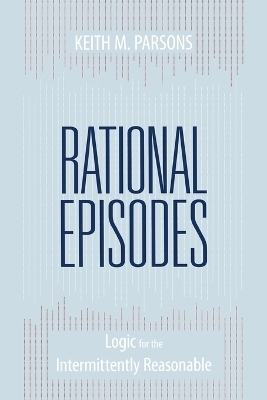
Rational Episodes
Logic for the Intermittently Reasonable
Seiten
2009
Prometheus Books (Verlag)
978-1-59102-730-0 (ISBN)
Prometheus Books (Verlag)
978-1-59102-730-0 (ISBN)
Logic is the skill that enables humans to think clearly, accurately, and rigorously and so to draw only the inferences that the evidence warrants. This book deals with sentential and predicate logic, as well as inductive and scientific reasoning, including inference to the best explanation.
Logic is the skill that enables humans to think clearly, accurately, and rigorously and so to draw only the inferences that the evidence warrants. Some people, like scientists, engineers, mathematicians, and computer programmers, get plenty of on-the-job practice in thinking logically. The rest of us generally don't. In this accessible, concise, yet comprehensive introduction to a sometimes formidable subject, philosopher Keith Parsons presents elementary topics in logic for people who have little background in mathematics or science and have no career goals in those fields. Parsons presupposes no specialized background and strives to introduce even abstract concepts in an intuitive and unintimidating way. His informal, conversational style leads the reader painlessly, even entertainingly, through three essential areas of logic. The first part of the book deals with sentential and predicate logic, as well as inductive and scientific reasoning, including inference to the best explanation. The second part explains basic probability, Bayes' Theorem, and why thinking about probability is prone to error and illusion.
The third part considers informal reasoning and critical thinking, including such topics as rhetoric, fallacies, political spin, and the detection of pseudoscience and pseudo history. Why be logical? Even if you are and artist or just a free spirit, logic can help to determine the facts behind the political propaganda, religious claims, advertising, and sales talk that we are all subjected to. As a logically literate person, you will be a better-informed citizen, wiser consumer, and a clearer thinker.
Logic is the skill that enables humans to think clearly, accurately, and rigorously and so to draw only the inferences that the evidence warrants. Some people, like scientists, engineers, mathematicians, and computer programmers, get plenty of on-the-job practice in thinking logically. The rest of us generally don't. In this accessible, concise, yet comprehensive introduction to a sometimes formidable subject, philosopher Keith Parsons presents elementary topics in logic for people who have little background in mathematics or science and have no career goals in those fields. Parsons presupposes no specialized background and strives to introduce even abstract concepts in an intuitive and unintimidating way. His informal, conversational style leads the reader painlessly, even entertainingly, through three essential areas of logic. The first part of the book deals with sentential and predicate logic, as well as inductive and scientific reasoning, including inference to the best explanation. The second part explains basic probability, Bayes' Theorem, and why thinking about probability is prone to error and illusion.
The third part considers informal reasoning and critical thinking, including such topics as rhetoric, fallacies, political spin, and the detection of pseudoscience and pseudo history. Why be logical? Even if you are and artist or just a free spirit, logic can help to determine the facts behind the political propaganda, religious claims, advertising, and sales talk that we are all subjected to. As a logically literate person, you will be a better-informed citizen, wiser consumer, and a clearer thinker.
Keith Parsons (Houston, TX), is professor of philosophy at the University of Houston, Clear Lake; the author of God and the Burden of Proof, among other books; and the editor of The Science Wars: Debating Scientific Knowledge and Technology.
| Erscheint lt. Verlag | 15.4.2010 |
|---|---|
| Verlagsort | Amherst |
| Sprache | englisch |
| Maße | 152 x 229 mm |
| Gewicht | 454 g |
| Themenwelt | Geisteswissenschaften ► Philosophie ► Logik |
| ISBN-10 | 1-59102-730-6 / 1591027306 |
| ISBN-13 | 978-1-59102-730-0 / 9781591027300 |
| Zustand | Neuware |
| Informationen gemäß Produktsicherheitsverordnung (GPSR) | |
| Haben Sie eine Frage zum Produkt? |
Mehr entdecken
aus dem Bereich
aus dem Bereich
ein Gegenentwurf zum kurzfristigen Denken : so werden wir zu den …
Buch | Hardcover (2023)
REDLINE (Verlag)
CHF 27,90
Buch | Softcover (2023)
De Gruyter (Verlag)
CHF 34,90


